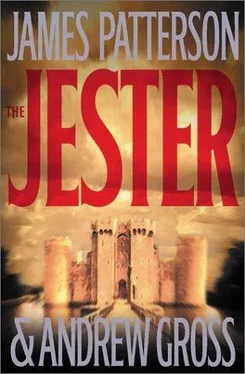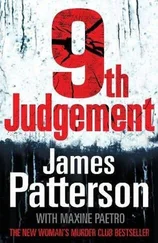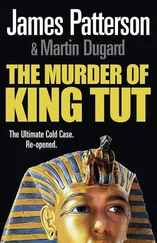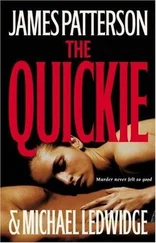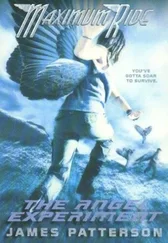Piece by piece, the town came back to life. Farmers prepared for the harvest. Crumbled homes were patched together with mortar and stone. Harvest time would bring travelers to market; travelers meant money. Money bought food and clothes. People began to laugh once more, and to look forward.
And I became a bit of a hero in town. In no time at all, my stories of how I had dazzled the court at Treille and fought the knight Norcross became part of the local lore. Children clung to my side. “Show us a flip, Hugh. And how you got out of the chains.” I amused them with my tricks, removed beads or stones from their ears, told stories of the war. I felt my soul being restored by the sound of their laughter. Yes, laughter truly heals. This was the great lesson I’d learned as a jester.
And I mourned my sweet Sophie. Each day before sunset, I climbed the knoll outside town and sat at my son’s grave. [251] I spoke to Sophie as if she rested there too. I told her of the progress on the inn. How the town had banded together around me.
And sometimes I spoke to her of Emilie. What a gift it had been to have her as a friend. How she saw something special in me as no other noble had, from that very first day. I recounted the times she had saved me. How I would have been a lifeless mound had she not come upon me after my fight with the boar.
Each time I talked of Emilie, I could not fail to notice the flame that stirred in my blood. I found myself thinking of our kiss. I did not know if it was meant to bring back my wits in a frantic moment or just as the last good-bye of a true friend. What had she seen in me to risk so much? A specialness … a specialness , Sophie! Sometimes I even felt myself blush.
One such afternoon as I was heading back to town from the gravesite, Odo ran up the path toward me. “Quick, Hugh, you can’t go back there now. You have to hide!”
I gazed beyond him. Four riders were approaching over the stone bridge. One an official, colorfully robed and wearing a plumed hat. The other soldiers, wearing the purple and white of Treille.
My heart stood still.
“It’s Baldwin ’s bailiff,” Odo said. “If he sees you here, we will all be dead.”
I ducked behind a copse of trees, my mind flashing through options. Odo was right; I could not go back there. But what if someone gave me up? It would not be enough just to run. The town would be held accountable.
“Bring me a sword,” I said to Odo.
“A sword? Do you see those soldiers, Hugh? You must go. Run as if a beggar had your purse.”
I crouched, hidden from sight, and headed toward the eastern woods. A few people saw me scurry away. I crossed the stream at a low point and thrashed my way into the brush.
[252] I found a spot near the square and watched the bailiff clip-clop his way forward like Caesar on a stallion.
An anxious crowd formed around him, buzzing. A bailiff never brought good news: only higher taxes and harsh decrees.
He took out two official-looking documents. “Good citizens of Veille du Père.” He cleared his throat. “Your lord, Baldwin, sends his greetings.
“ ‘In compliance,’ ” he began, “ ‘with the laws of the land, in the reign of Philip Capet, king of France, Baldwin, duke of Treille, decrees all subjects known to give aid or shelter to the fugitive known as Hugh De Luc, a cowardly murderer , shall be treated as accomplices to the above-mentioned fugitive and receive the full and swift measure of the law.’ Which, for you sow-addled farmers who may not fully understand, means hanged by the neck until dead.
“ ‘Additionally,’ ” he went on, “ ‘all lands, property, and belongings owned or leased from the duchy by such persons shall be immediately forfeited, confiscated, and returned to the demesne, and all spouses, siblings, and descendents, free or indentured, shall be sworn into lifelong service to his liege.’ ”
My blood almost burst through my veins. The town was being punished for my crimes. All personal property handed over, worked lands returned, families ripped apart. I waited, holding my breath, for a voice to cry out against me. A wife, at wit’s end, afraid to lose any more. An unknowing child…
The bailiff took a long, measuring look around. He was an obscenity. “Thoughts, townspeople…? A sudden change of heart?” There was a tense, drawn-out silence. But no one spoke up. Not one of them.
Then Father Leo stepped forward. “Once again, bailiff, our lord, Baldwin, shows he is a wise and charitable liege.”
The bailiff shrugged. “Appropriate measures, Father. Word has it the scum is back in these parts.”
“So what good news have you brought in your other decree?” someone called out.
[253] “Almost forgot…” He smiled and rapped his head. He unfurled the parchment and, without reading, nailed it to the church wall. “General increase in taxes. All raised ten percent.”
“What!” A gasp escaped from the crowd. “That’s not fair. It cannot be.”
“Sorry.” The bailiff shrugged. “You know the reasons… Dry summer, stocks are low…”
Then, all at once, the bailiff stopped talking. Something had caught his eye. He stood there, motionless. It was the inn. My heart clenched in my throat.
“Is this not the inn that only weeks ago was burned to the ground? The one belonging to the person we seek?” No one answered. “Who is rebuilding it? If my memory serves me, the last of its proprietors was, shall we say… torn apart by grief.”
A few eyes traveled about uneasily.
“Who rebuilds it, I say?” The bailiff picked up one of the stones.
I began to tremble. This was surely it! The end of me.
Then a voice rang out of the crowd. “The town rebuilds it, bailiff.” It was Father Leo. “The town needs an inn.”
The bailiff’s eyes lit up. “Most charitable, Father. And most assuring to hear this from you, a man whose word is above refute. So tell me, who will run this establishment?”
Another silence.
“I will,” shouted a voice. Marie, the miller’s wife. “I will tend to the inn while my husband mans the mill.”
“You are most enterprising, madame. A good choice, I think, since you seem to have no heirs to run your mill.”
The bailiff held her gaze. I could see he was unsure whether to believe a word. Then he tossed the stone he still held aside and made his way to his mount.
“I hope this is all true.” He sniffed and pulled the reins. “Perhaps on my next visit I will stay longer, madame. I look forward to the chance to test your hospitality for myself.”
AS SOON AS THE HATED BAILIFF was out of sight, panic spread through town. I marched back out of the woods, grateful that no one had spoken against me. But I saw the mood had changed.
“What do we do now?” A frightened Martin the tailor shook his head. “You heard him; the prick suspects. How long can we keep up this ruse?”
Jean Dueux, a farmer, looked ashen. “The land we work returned to the demesne? We’d be ruined. Our entire lives lie in this land.”
People crowded around me, shouting and afraid. I was the cause of their misery. “If you want me to leave, I will.” I bowed my head.
“It’s not you,” the tailor said, looking around for support. “Everyone’s afraid. We’ve finally picked ourselves up from the ruins. If Baldwin ’s men come back…”
“They will come back, Martin,” I said to his worried face. “They will come back again and again. Whether I stay or go.”
“We took you in,” the baker’s wife shouted. “What is it you expect us to do now?”
I went over to the inn, and I felt my wife’s soul stirring in the rubble. “Do you think I drag these rocks every day and sweat [255] building these walls so that this inn I promised my dead wife I would rebuild can be brought down once again?”
Читать дальше
